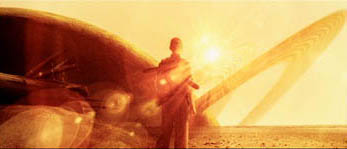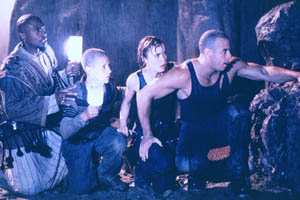|
With the coming of the runaway hit Aliens in 1986, probably half of cinematic sci-fi was given over to the sub-genre of "buglike creatures slowly attenuate the cast on a space station/remote planet/derelict freighter/whatever." No one has yet toppled Aliens as the best of the bunch, either. But with Pitch Black, we've finally been given another one worth seeing. Latest comer to the world of "bug hunt" flicks is David Twohy, who introduced the filmgoing world to multiple-murderer Richard Riddick, a character that proved popular enough here to spawn at least one more film. As we open, Riddick is on his way to the authorities on a spaceship full of normal non-murderers when the ship encounters a meteor storm and is forced down on a seemingly deserted planet. In the post-crash chaos, Riddick escapes confinement, but even greater dangers await the survivors on this world, where day is perpetual but for the very occasional eclipse.  It's those bugs I mentioned earlier, if you haven't guessed. The bugs are extremely photosensitive (such that they would never have evolved on a planet with three suns, but whatever), and once the eclipse hits all hell starts breaking loose and the fun really starts. The crew members have little choice but to ally themselves with the killer amongst them in order to survive the plagues of angry space locusts and return to their downed ship with the necessary parts to repair it and get gone. As the title indicates, this all happens in total darkness, and the bugs become much more of a spooky presence once they're unseen but still certainly lurking just out of flashlight range. The tension of the whole affair rapidly begins to eat away at all of the crash survivors who aren't cold-blooded murderers with night vision, and the film keeps its audience in the dark as much as it does the characters. This isn't an intellectual film, and it isn't trying to be, but it is an effective mood piece. Traveling in an ever-shrinking pool of protective light manages to effect both claustrophobia and agoraphobia at once, which is a shtick I don't think I've seen before. For films in such a specified category, innovation is a must, and it's quite gratifying to find some here. The characters themselves are a little lightweight, so the suspense isn't as effective as it might be with a cast we were more involved with. Riddick isn't a flat-out psycho, just an amoral bastard, so he's not quite as threatening unbound as a Hannibal Lecter type would be-though in all fairness, no one would willingly let a psycho loose to begin with. There's the natural, humanistic tendency to want to see the antihero exhibit a little bit of decency, which is why it would have been a more interesting decision for him to have shown none at all. It ends up being another nod towards our society's fascination with how "cool" asshole killers are, which they really aren't, a fact the film deals with slightly less than I'd have preferred. There's a bit of development with pilot Carolyn Fry, who nearly sacrificed the crew during the out-of-control descent to save the ship, and a little bit with the token god-seeker, though atypically they made him Islamic-one wonders if this decision would've remained unchanged had the film come out the following year. Mostly it's the cast of characters we'd expect from such a film, and following standard filmic rules, it's not unduly hard to figure out who'll survive. My best advice would be not to think about it too hard.  There are some points where we must suspend our disbelief by the thinnest of threads: the mere fact of Carolyn's survival of the crash is ludicrous given the way it's portrayed here, and one must wonder why the bugs, who emerge from their underground lairs well before total sunset, are actually repulsed by small torches and lights with about a million times less candle power. The speed with which the eclipse is seen to occur also begs the question of why it doesn't recede just as rapidly, which is why the film still doesn't knock Aliens out of the top spot for films of this type. However, there's one cool scene near the end that the film actually allows the audience to figure out for themselves without any help from exposition, and I have to give credit for that. Most films don't trust their audience that much, and when one does, I have to get some measure of the warm fuzzies for it. Twohy's direction is good, and there are some memorable shots and cool images scattered about throughout the film. He also wisely chose to use the bugs as a mostly unseen threat instead of constantly dangling them in front of us. It's a solid work overall, though there's no particularly genre-defining moments or standout sequences. But it is about flesh-eating space bugs, after all, so I suppose we as audience members can't get all that greedy. We can mostly just hope to have fun, and as I did, I can say it did its job well enough. -review by Matt Murray
|
|
||||||||